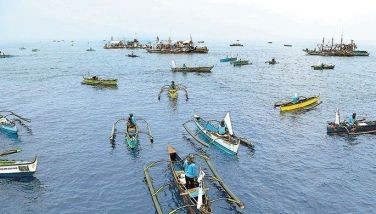Lawmaker warns POEA against unfair treatment of unskilled workers
November 27, 2005 | 12:00am
Unskilled Filipino workers like domestic helpers who want to work abroad should not settle for a salary below $200 or P10,800 a month as the government has a responsibility to protect them from abuses, a lawmaker said yesterday.
Lone Catanduanes Rep. Joseph Santiago said the Philippine Overseas Employment Administration (POEA) has to be watchful of the "wholesale overseas deployment of unskilled workers that tend to be extremely vulnerable to employer abuse."
Skilled workers like nurses, doctors, engineers, teachers and the like are not a cause for concern, Santiago said, since "their talents naturally protect them."
He noted these workers were "seldom mistreated since their skills are badly needed, and are not easily replaceable."
"However, domestic helpers, particularly those lacking adequate formal education, are most susceptible to ill-treatment because they may be readily substituted by other foreign workers," he added.
Santiago, former head of the National Telecommunications Commission, issued the warning in the wake of POEA’s announcement that it would soon be deploying unskilled workers, mostly domestic helpers, through the agency’s special hiring "packaged deals."
Under this, unskilled laborers would be required to shoulder the placement fees, and would be recruited mainly from "poverty zones" in the provinces. Many college-trained Filipinos now work as domestic helpers or babysitters in Hong Kong, Singapore, Taiwan and other Asian countries.
But Santiago said these college-educated housekeepers or nannies tend to be better protected than their counterparts who finished only high school.
Santiago also suggested that government use the proposed Japan-Philippine Economic Trade Agreement (JPEPA) to get more jobs for Filipino health workers in Japan.
"We support Labor Secretary (Patricia) Sto. Tomas’s position that Japan, under the JPEPA, should allow the demand-driven hiring of Filipino nurses and caregivers. We should not agree to a restrictive quota-based system," he said.
The POEA expects the total number of Filipino workers deployed overseas to reach 1,006,496 this year, up nearly eight percent or 72,908 from the 933,588 deployed last year.
In the six months to June this year, the number of Filipino workers deployed abroad already reached 541,201, an increase of almost 10 percent or 47,254 compared to the 493,947 deployed over the same period last year. — Delon Porcalla
Lone Catanduanes Rep. Joseph Santiago said the Philippine Overseas Employment Administration (POEA) has to be watchful of the "wholesale overseas deployment of unskilled workers that tend to be extremely vulnerable to employer abuse."
Skilled workers like nurses, doctors, engineers, teachers and the like are not a cause for concern, Santiago said, since "their talents naturally protect them."
He noted these workers were "seldom mistreated since their skills are badly needed, and are not easily replaceable."
"However, domestic helpers, particularly those lacking adequate formal education, are most susceptible to ill-treatment because they may be readily substituted by other foreign workers," he added.
Santiago, former head of the National Telecommunications Commission, issued the warning in the wake of POEA’s announcement that it would soon be deploying unskilled workers, mostly domestic helpers, through the agency’s special hiring "packaged deals."
Under this, unskilled laborers would be required to shoulder the placement fees, and would be recruited mainly from "poverty zones" in the provinces. Many college-trained Filipinos now work as domestic helpers or babysitters in Hong Kong, Singapore, Taiwan and other Asian countries.
But Santiago said these college-educated housekeepers or nannies tend to be better protected than their counterparts who finished only high school.
Santiago also suggested that government use the proposed Japan-Philippine Economic Trade Agreement (JPEPA) to get more jobs for Filipino health workers in Japan.
"We support Labor Secretary (Patricia) Sto. Tomas’s position that Japan, under the JPEPA, should allow the demand-driven hiring of Filipino nurses and caregivers. We should not agree to a restrictive quota-based system," he said.
The POEA expects the total number of Filipino workers deployed overseas to reach 1,006,496 this year, up nearly eight percent or 72,908 from the 933,588 deployed last year.
In the six months to June this year, the number of Filipino workers deployed abroad already reached 541,201, an increase of almost 10 percent or 47,254 compared to the 493,947 deployed over the same period last year. — Delon Porcalla
BrandSpace Articles
<
>
- Latest
- Trending
Trending
Latest
Trending
Latest
Recommended





























